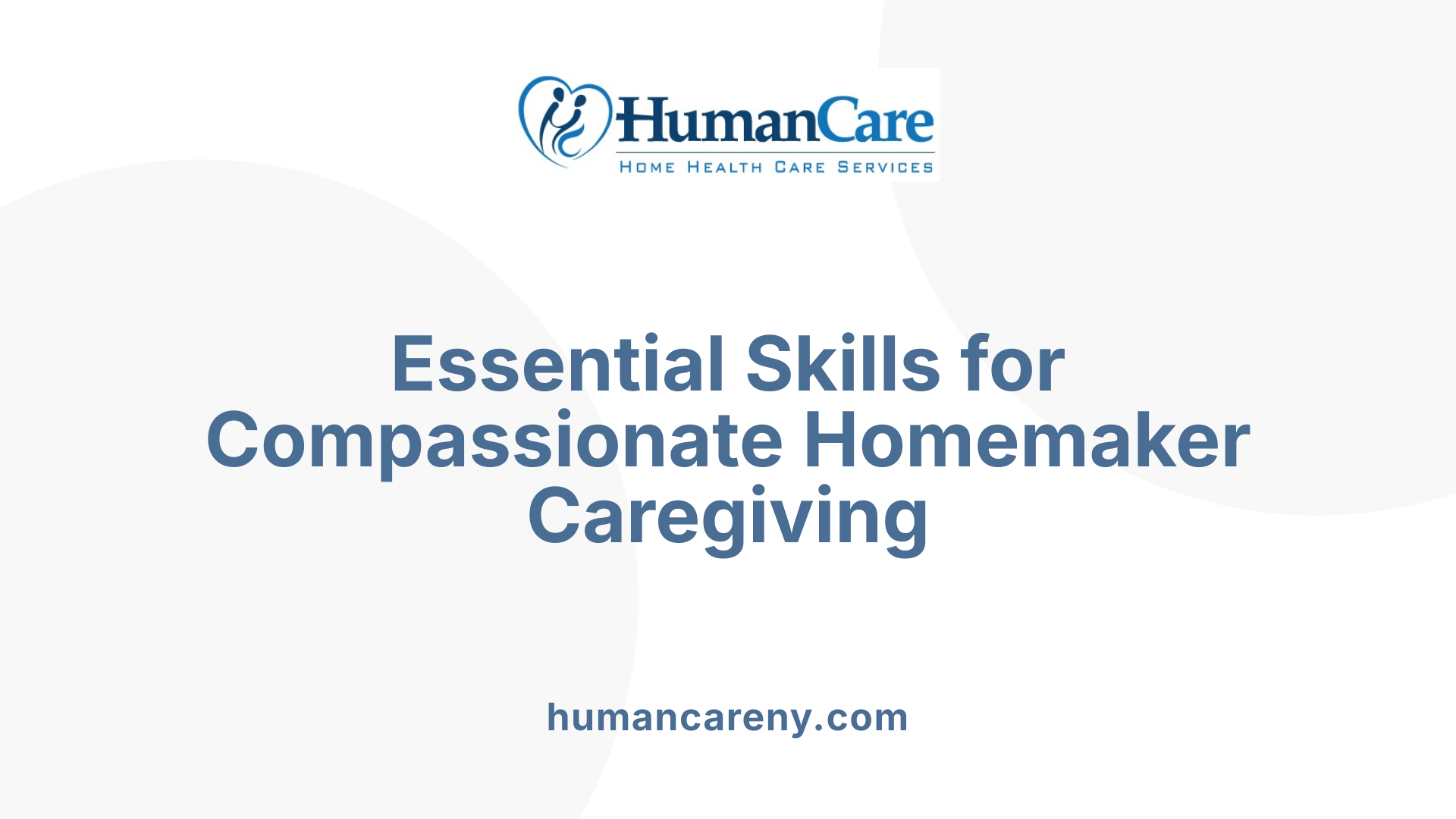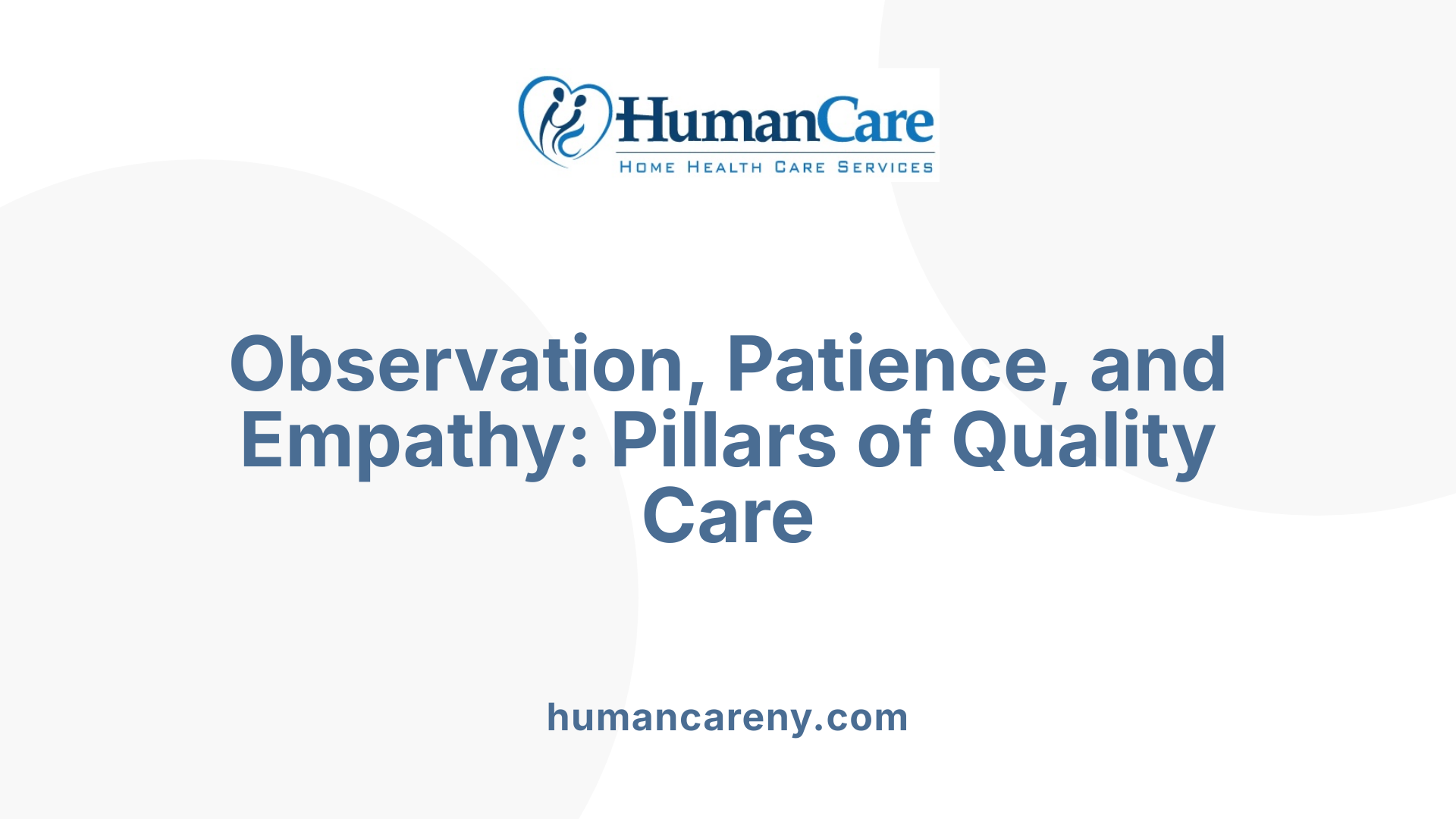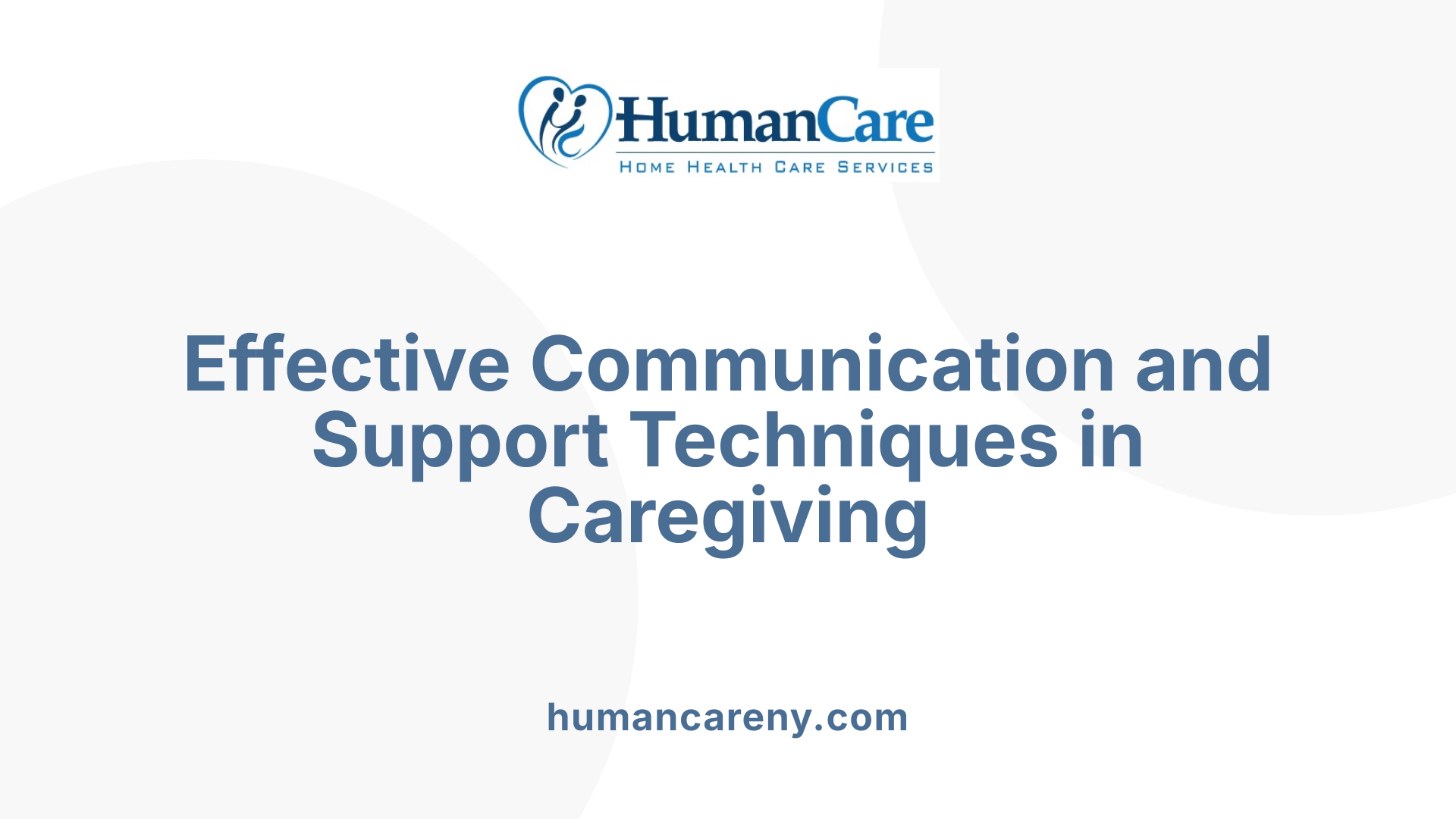Understanding the Foundation of Compassionate Caregiving
A compassionate homemaker caregiver plays a vital role in ensuring the health, safety, and emotional well-being of their loved ones. Developing essential skills involves a combination of personal qualities, technical abilities, and interpersonal strategies that foster trust, respect, and effective support. This article explores the core competencies necessary for becoming a truly compassionate caregiver, emphasizing the importance of emotional intelligence, communication, organization, and cultural sensitivity.
Personal Qualities and Traits for Effective Caregiving
What personal qualities and traits are essential for effective caregiving?
Successful caregiving hinges on a blend of personal characteristics that foster trust, safety, and compassion. Among these, compassion and empathy stand out as foundational qualities. They enable caregivers to understand, genuinely care for, and emotionally connect with care recipients, significantly enhancing the quality of care.
Patience and reliability are equally vital. Patience allows caregivers to handle slow progress, repetitive questions, or emotional resistance calmly, without frustration. Reliability ensures caregivers are punctual, consistent, and trustworthy, which helps build a strong, trusting relationship with those they care for.
Emotional resilience and self-care are necessary to sustain long-term caregiving. The demanding nature of care work can lead to burnout if caregivers do not manage stress properly. Setting healthy boundaries and prioritizing their own well-being are crucial practices that enable caregivers to maintain high-quality support over time.
Effective communication skills, including active listening, clear expression, and sensitivity to non-verbal cues, are essential for understanding needs, building rapport, and avoiding misunderstandings.
Flexibility and problem-solving abilities empower caregivers to adapt swiftly to changing situations, manage unforeseen challenges, and ensure continuous quality care. From modifying routines to responding effectively during emergencies, these skills keep caregiving responsive and effective.
Caregivers should also develop strong organizational and time-management skills. These facilitate the seamless coordination of routines, medication schedules, and appointments, reducing stress and ensuring safety.
In summary, a combination of compassion, patience, reliability, emotional strength, adaptability, and good communication creates an environment where care recipients feel respected, understood, and supported. This holistic set of qualities fosters trust and enhances the overall caregiving experience.
Core caregiving skills essential for a homemaker caregiver

What are the core caregiving skills required for a compassionate homemaker caregiver?
A homemaker caregiver plays a vital role in ensuring the well-being of their loved ones or clients. Their effectiveness hinges on several core skills that combine technical ability, emotional sensitivity, and organizational competence.
Effective communication forms the foundation of good caregiving. This includes verbal communication for giving clear instructions and listening actively to understand concerns. Non-verbal cues, like gestures, facial expressions, and body language, are equally important for conveying empathy and gauging unspoken needs. Proper documentation of health and care routines further supports consistent and safe care.
Empathy, active listening, and understanding are essential qualities. Showing genuine care helps build trust and emotional bonds, which can ease anxiety and encourage cooperation. Patience and emotional resilience are necessary to handle behavioral or emotional challenges with calmness and reassurance, creating a reassuring environment for the care recipient.
Observation skills enable caregivers to notice subtle changes in health or mood that could indicate underlying issues. Early detection allows for timely intervention and adherence to prescribed care plans. Caregivers must also be physically capable—possessing stamina and strength to assist with mobility and daily tasks safely while maintaining their own health.
Organization, time management, and meticulous record-keeping are crucial for managing routines, medications, appointments, and emergencies. These skills ensure that care is consistent, efficient, and respectful of the recipient’s dignity.
Cultural competency and respect for diversity enhance personalized care. Recognizing individual backgrounds and traditions fosters a supportive and inclusive environment.
Finally, basic medical knowledge, including understanding common health conditions, first aid, and emergency procedures, equips caregivers to handle routine health needs and respond effectively during crises. Together, these skills create a comprehensive approach to compassionate, respectful, and efficient caregiving—aligned with the needs of those they serve.
The importance of observation, patience, and empathy in caregiving

How do observation, patience, and empathy contribute to quality caregiving?
Exceptional caregiving relies heavily on the caregiver’s ability to notice the smallest signs of change in a patient’s health or mood. Observation skills enable caregivers to detect subtle shifts, such as a slight change in appetite, mood, or physical condition, which might indicate emerging health issues. This vigilance allows for prompt intervention, enhancing patient safety and health outcomes.
Patience plays a vital role in managing challenging situations without frustration. When caring for individuals who may ask repetitive questions, move slowly, or resist assistance, patience helps maintain a calm and supportive environment. This approach fosters trust and helps reduce the patient’s stress and anxiety.
Empathy allows caregivers to emotionally connect with patients. Understanding their feelings and experiences promotes a sense of security and trust. When patients feel understood and cared for, they are more likely to cooperate and communicate openly.
Together, observation, patience, and empathy improve the overall quality of care by creating a compassionate, responsive, and trustworthy environment. These qualities ensure that caregivers are not only attentive to medical needs but also attuned to emotional and psychological well-being.
This combination also strengthens communication. Both verbal and non-verbal cues are better understood when caregivers are present, patient, and empathetic. They can tailor their responses and offer reassurance that is respectful and personalized.
Ultimately, these qualities cultivate a caring atmosphere that promotes comfort and satisfaction for the care recipient. The result is a relationship rooted in trust, compassion, and respect, which significantly enhances health outcomes and quality of life.
Effective communication and emotional support techniques

Which communication and emotional support techniques are most effective for caregivers?
Caregivers must master a variety of communication strategies to foster trust, understanding, and emotional well-being with their care recipients. Active listening is fundamental; it involves giving full attention, nodding, and providing verbal acknowledgments to show the person they are heard. Validating feelings—such as saying, “It’s understandable to feel upset”—helps to build rapport and comfort.
Using clear and simple language is crucial, especially when caring for older adults or those with cognitive challenges. Avoiding jargon and speaking slowly ensures the message is understood without confusion.
Assertiveness paired with honesty helps caregivers set boundaries, advocate for their care recipients, and have open discussions about health concerns or treatment options. Respectful communication builds trust and encourages transparency.
Non-verbal cues like body language and facial expressions often convey more than words. Maintaining eye contact, using an open posture, and offering gentle smiles or reassuring gestures can strengthen emotional connections, particularly with individuals who have hearing difficulties or memory issues.
Involving care recipients in decision-making fosters their sense of independence and dignity. Asking about their preferences, listening to their concerns, and including them in planning routines or activities enhances their emotional health.
Providing reassurance and demonstrating kindness through gentle touch, encouraging words, and patience reinforces a safe environment. Consistency and familiarity, coupled with thoughtful preparation—such as listing questions before medical appointments—can greatly improve communication.
Overall, these techniques combine to create a compassionate atmosphere that supports emotional resilience, promotes cooperation, and enhances the quality of care.
Organizational and problem-solving skills for responsive caregiving

What organizational and problem-solving skills are important in caregiving roles?
Effective caregiving relies heavily on strong organizational and problem-solving abilities. Caregivers must maintain detailed care plans that include medical histories, medication schedules, and daily routines. Using tools like pill organizers and digital calendars helps in managing medications and appointments accurately, reducing the chances of errors.
Tracking health information meticulously is essential for noticing changes in the care recipient’s condition and for communicating effectively with healthcare providers. Documentation of symptoms, medication intake, and behavioral changes ensures continuity of care and informs necessary adjustments.
Problem-solving skills enable caregivers to handle unexpected situations efficiently. This includes preparing emergency files, creating backup plans for emergencies, and involving the care recipient in care planning to foster a sense of control and involvement.
Being adaptable is equally important. Changing health conditions or unforeseen circumstances may require quick adjustments to routines or care strategies. Caregivers should also establish support networks or backup caregivers to ensure ongoing assistance.
Clear and effective communication with healthcare teams is vital. This ensures that instructions are understood, concerns are addressed, and care is coordinated seamlessly. Building trust through honest and empathetic communication enhances the caregiving relationship.
Caregivers should develop these skills to deliver timely, respectful, and personalized care. Their ability to organize, anticipate, and respond to challenges directly impacts the wellbeing and safety of the person they care for.
Below is a table summarizing essential skills and practical tools involved:
| Skill or Tool | Description | Best Practices |
|---|---|---|
| Care plan management | Organizing medical and personal care details | Use digital spreadsheets, physical folders, or care apps |
| Medication management | Ensuring correct dosage and timing | Pill organizers, medication maps, reminder alerts |
| Emergency preparedness | Planning for crises and unexpected events | Emergency files, contact lists, support contacts |
| Communication with healthcare providers | Sharing updates and asking questions | Scheduled calls, written summaries, care journals |
| Problem-solving & adaptability | Responding to sudden needs or issues | Backup routines, flexible schedules, involving care team |
| Task prioritization | Managing daily responsibilities efficiently | Daily schedules, to-do lists, time-blocking |
By honing these skills, caregivers can provide more effective, compassionate, and safe care, ultimately enhancing the quality of life for those they support.
Physical stamina and cultural competency in caregiving

What physical stamina and cultural competency are necessary for compassionate care?
Physical stamina is vital for caregivers to handle the demands of their roles effectively. Tasks such as lifting, transferring, assisting with mobility, and long hours of care require sustained energy and strength. Without adequate physical endurance, caregivers risk fatigue and injury, which can compromise both their well-being and the quality of care they provide.
Cultural competency involves understanding and respecting the diverse backgrounds of patients, including their cultural, religious, and spiritual beliefs. Recognizing these aspects helps caregivers offer personalized care that aligns with the individual's values and preferences. For example, understanding the importance of family roles in decision-making or observing specific dietary restrictions demonstrates respect and sensitivity.
Developing cultural humility is a continuous process of self-reflection and openness. Caregivers should actively seek to learn about different cultural practices and avoid assumptions. Effective communication, including being open to questions and culturally appropriate dialogue, fosters trust and strengthens relationships.
Barriers like language differences or social norms can hinder effective care. Overcoming these challenges involves using interpreters, visual aids, or learning basic phrases in the patient's language. It also includes being aware of social sensitivities and demonstrating respect through gestures and behavior.
Combining physical stamina with cultural awareness enables caregivers to deliver compassionate, respectful, and tailored support. This dual focus enhances trust, promotes safety, and ensures that care respects each individual's unique background and needs.
| Aspect | Importance | Tips for Caregivers |
|---|---|---|
| Physical stamina | Ensures safe, consistent physical task performance | Maintain fitness, practice proper body mechanics |
| Cultural awareness | Builds trust and delivers personalized care | Educate yourself about cultural practices, ask questions respectfully |
| Cultural humility | Fosters ongoing learning and self-improvement | Engage in self-reflection, seek feedback, stay open-minded |
| Overcoming barriers | Facilitates effective communication and service delivery | Use interpreters, learn key phrases, utilize visual cues |
By dedicating effort to both physical fitness and cultural understanding, caregivers can profoundly impact their patients’ well-being, ensuring dignity, respect, and effective support tailored to individual backgrounds.
Developing key competencies for compassionate homemaker caregiving
How can one develop key competencies for compassionate homemaker caregiving?
Building effective skills for caring at home involves a blend of structured training, hands-on practice, and personal development. First, enrolling in comprehensive training and certification programs is fundamental. These programs teach essential caregiving skills, such as clear communication, empathy, cultural sensitivity, and safety protocols.
Practical experience is equally important. Engaging in supervised caregiving tasks allows individuals to apply their learning directly, honing observation skills, problem-solving abilities, and technical procedures like medication management and basic medical care.
Continuing education plays a vital role in keeping caregivers updated with the latest practices and reinforcing their skills. This ongoing learning ensures caregivers remain competent and confident under changing circumstances.
Cultivating personal qualities is critical as well. Patience helps manage challenging behaviors without frustration. Emotional intelligence, including self-awareness and empathy, fosters genuine connections with care recipients. Resilience enables caregivers to handle stress and recover from setbacks.
Innovative programs, such as simulation training like CARERS, simulate real-life scenarios in a controlled environment. These exercises prepare caregivers to respond calmly and effectively during emergencies or behavioral issues.
Supportive networks, regular assessments, and integration into healthcare teams contribute to a caregiver’s growth. They provide feedback, encouragement, and resources, enhancing the caregiver’s ability to deliver person-centered care with trust and professionalism.
In summary, developing key competencies involves a structured journey of education, practical application, personal growth, and continuous support, all aimed at providing compassionate, high-quality care at home.
Building a Compassionate Care Environment
Mastering these essential skills—spanning personal qualities, technical expertise, and interpersonal approaches—lays the foundation for genuine compassion and effective support. A homemaker caregiver who continually develops their communication, observation, organization, and cultural skills, while maintaining emotional resilience, can foster a nurturing environment where loved ones feel valued, safe, and understood. Emphasizing ongoing learning, self-care, and collaboration with healthcare professionals ensures that caregiving remains sustainable and profoundly impactful, ultimately enriching the lives of both caregiver and recipient.
References
- 8 Essential Caregiver Skills You Need To Succeed
- Essential Skills for Family Caregivers: What You Need to ...
- Best Qualities of a Good Caregiver
- Caregiver Essential Skills That Lead to Compassionate Care
- Essential Skills Every Caregiver Should Have
- Caregiver skills - communication, compassion, support
- Qualities of a Good Caregiver: Key Traits That Matter Most
- 11 Unique Skills You Need to Become a Caregiver



